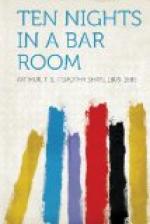“I readily grant you that.”
“And it’s nearly seven years since he commenced to take lessons. A great deal may be learned, sir, of good or evil, in seven years, especially if any interest be taken in the studies.”
“True.”
“And it’s true in this case, you may depend upon it. Simon Slade is not the man he was, seven years ago. Anybody with half an eye can see that. He’s grown selfish, grasping, unscrupulous, and passionate. There could hardly be a greater difference between men than exists between Simon Slade the tavern-keeper, and Simon Slade the miller.”
“And intemperate, also?” I suggested.
“He’s beginning to take a little too much,” was answered.
“In that case, he’ll scarcely be as well off five years hence as he is now.”
“He’s at the top of the wheel, some of us think.”
“What has led to this opinion?”
“He’s beginning to neglect his house, for one thing.”
“A bad sign.”
“And there is another sign. Heretofore, he has always been on hand, with the cash, when desirable property went off, under forced sale, at a bargain. In the last three or four months, several great sacrifices have been made, but Simon Slade showed no inclination to buy. Put this fact against another,—week before last, he sold a house and lot in the town for five hundred dollars less than he paid for them, a year ago—and for just that sum less than their true value.”
“How came that?” I inquired.
“Ah! there’s the question! He wanted money; though for what purpose he has not intimated to any one, as far as I can learn.”
“What do you think of it?”
“Just this. He and Green have been hunting together in times past; but the professed gambler’s instincts are too strong to let him spare even his friend in evil. They have commenced playing one against the other.”
“Ah! you think so?”
“I do; and if I conjecture rightly, Simon Slade will be a poorer man, in a year from this time, than he is now.”
Here our conversation was interrupted. Some one asked my talkative friend to go and take a drink, and he, nothing loath, left me without ceremony.
Very differently served was the supper I partook of on that evening, from the one set before me on the occasion of my first visit to the “Sickle and Sheaf.” The table-cloth was not merely soiled, but offensively dirty; the plates, cups, and saucers, dingy and sticky; the knives and forks unpolished; and the food of a character to satisfy the appetite with a very few mouthfuls. Two greasy-looking Irish girls waited on the table, at which neither landlord nor landlady presided. I was really hungry when the supper-bell rang; but the craving of my stomach soon ceased in the atmosphere of the dining-room, and I was the first to leave the table.
Soon after the lamps were lighted, company began to assemble in the spacious bar-room, where were comfortable seats, with tables, newspapers, backgammon boards, dominoes, etc. The first act of nearly every one who came in was to call for a glass of liquor; and sometimes the same individual drank two or three times in the course of half an hour, on the invitation of new comers who were convivially inclined.




